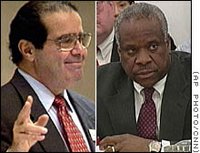

The President nominates a candidate for the High Court. The Senate's role is to "advise and consent". Consent means the Senate can accept or reject the President's nominee. The Senate, in a sense, represents the will and the common good of the people. The Senate should never out of respect or misguided courtesy feel that they should consent or agree 99% or even 50% of the time to the candidate proposed by the President. They should judge the nominee as to whether in their view he is the type of person to hold a seat on the court in terms of the welfare of the country and its people.
Now, we come to a sticky and complex matter, and like most of what I write is based on my premises, values and opinion.
There seems to be a large segment of the experts who believe that to hold a seat on the Supreme Court one should be a "strict constructionist," which usually means that one has a very "narrow" view of the Constitution's meaning.
Such a person would take the actual words of The Constitution and the context in which they are found, and extract from them the most limited or constricted sense.
I would hope that the prospective justice would consider the personalities of those most involved in writing the Constitution, their premises and views as found in other writings of theirs.
The strict constructionists, I assume, also believe in rigorous logic or reasoning, as devoid of emotion as possible. In fact, their process would be some what machine-like or, perhaps, computer-like--bordering on "artificial intelligence".
However, from my perspective, are the strict constructionists described above what we want on the court. They would seem to be lacking much of what we the people need from a judge, especially on our SUPREME Court.
These judges need to accept that although we revere the Constitution---it does represent the 18th Century thinking of a group of educated white men, some, like Jefferson, with slaves. Most of them did not conceive a role for women beyond wife and mother. They might be shocked, or at least greatly surprised in the wider world women live in now. They could not imagine the future with its problems, complexities, and entirely new situations.
Therefore, we need "supremes" who believe that the Constitution is more organic than inert; more developing than engraved in stone; fluid as well as static. These judges have to catch the essence of the meaning and spirit of the words in our Constitution. They must try to envisage what these men would think and write today if they were miraculously immersed in our world.
And, as for me, although I doubt many on the Court would feel this way: the Constitution has the quality of impermanence as does everything else in the universe. That it is not a perfect document. That the most influential founding fathers were Deists---not Evangelical fundamentalists, nor Roman Catholics, nor Jews for that matter.
We should honor the Constitution. Hold on to it because it does contain many of the ideas with which this country began. Many of the ideals and principles are sound and even wise-----but we should not treat it the way some treat the Bible---as the actual word of God.
If a narrowly constructed, constrictive interpretation of the Constitution, prevents us from dealing in a sane, intelligent, compassionate, wise way with the needs of the planet and the people in today's world----we have to either amend it or, and this is often the better way, to interpret it so that it can continue to remain a living, helpful guide to our national life.
-------------------------
What About Alito?
As we listen and watch the Senate Confirmation Hearings, the questions asked by the senators and the responses of Judge Sam Alito, we come to know something of a man who has served as lawyer for the Reagan Justice Department and served on the Third District Court of Appeals. His supporters present him as an highly skilled judge and lawyer who knows the law inside and out; who has no personal views, biases (even sub- or un-conscious); who looks at the words in the case and in the Constitution and the words in previous rulings and makes his decisions in an almost non-human manner, similar to well-trained and intelligent android.
YET-----when one examines the profile created by this unbiased, technical decisions, one sees a consistent profile:
--- Favoring large corporations
-- Supporting an overriding powerful (imperial) Presidency
-- Failing consistently to rule in favor of the environment
-- Not defending the privacy of the individual
-- Siding against minorities including gays and lesbians
-- Being lukewarm in the matter of civil rights
His strategy for arriving at decisions that fit this profile appears to consist in taking as narrow a view of the law as necessary---when necessary to meet his world view.
Naturally, he says he has no agenda. Yet every intelligent being has basic premises that underlie his/her decisions and actions. Judge Alito's premises, beliefs, attitudes or whatever
term you wish to apply --- are abundantly clear.
Alito would replace Sandra Day O'Connor who was the linchpin for this court. A practical, wise judge grounded not only in the Law and the Constitution but every the world we live in today. A judge with common sense, and a feeling for the people and our land. One who found her way to her decision by looking at facts and at the law; not by driving her decisions to conclusions that represented her personal profile. O'Connor was hard to predict.
By choosing Alito to replace O'Connor we would be putting on the Supreme Court a judge who would arguably be to the right of even Antonin Scalia and Clarence Thomas.
To choose Alito will set up a Supreme Court of ultra-conservative bent lasting many, many years. A long time after George II has gone, the neo-con philosophy will still have a strangle hold upon Americans. Remember, once chosen, a Supreme Court judge serves for life.
Posted on The Nation magazine's website, January 5, 2006:
"After a careful study, University of Chicago law professor Cass Sunstein described Alito's record of appeals court dissents as 'stunning. Ninety-one percent of Alito's dissents take positions more conservative than his colleagues...including colleagues appointed by Presidents Bush and Reagan.'"

